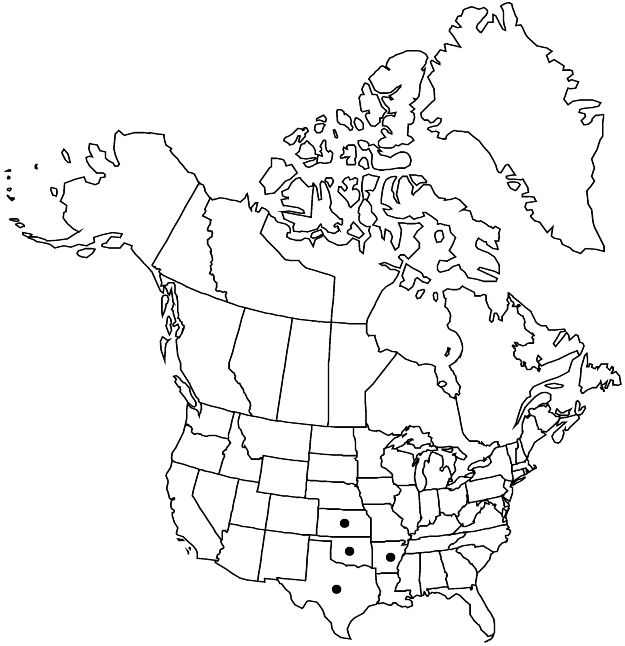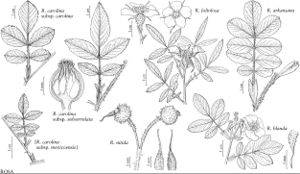Rosa foliolosa
Fl. N. Amer. 1: 460. 1840.
Shrubs, forming thickets or not. Stems erect to deflexed, 3–6 dm, densely branched; bark dull reddish brown, sometimes green, glabrous; infrastipular prickles paired, erect, subulate, 2–5 × 0.5–1 mm, base glabrous, internodal prickles or aciculi rare, sometimes absent. Leaves 3–7 cm; stipules 6–14 × 1.5–4 mm, auricles flared, 2–3 mm, margins entire or glandular-serrate, eglandular, surfaces glabrous, rarely puberulent, eglandular; petiole and rachis with pricklets, usually glabrous, stipitate-glandular; leaflets (5–)9(–11), terminal: petiolule 1–4(–6) mm, blade lanceolate to narrowly elliptic, 14–25 × 3–7 mm, membranous, base long-cuneate, margins 1-serrate, gland-tipped or eglandular, teeth 9–15 per side, gland-tipped, apex acute, abaxial surfaces light green, glabrous, eglandular, exserted midveins sometimes with sparse pricklets, pubescent, stipitate-glandular, adaxial deep green, lustrous, glabrous. Inflorescences corymbs, 1(–5)-flowered. Pedicels erect, slender, 2–8 mm, glabrous, stipitate-glandular; bracts 2, lanceolate, 8–12 × 3–4 mm, margins entire, few stipitate-glandular, surfaces glabrous, eglandular. Flowers 3.5–4.5 cm diam.; hypanthium subglobose, globose, or ovoid, 4–4.5 × 2.5–4 mm, glabrous, usually densely stipitate-glandular, neck absent; sepals reflexed or spreading, lanceolate, 13–20 × 2–3 mm, tip 3 × 0.5 mm, margins pinnatifid, abaxial surfaces glabrous or puberulent, stipitate-glandular; petals single, white, rarely pink, 17–28 × (6–)10–18 mm; carpels 20–32, styles exsert 1–1.5 mm beyond stylar orifice (1.5–2 mm diam.) of hypanthial disc (3–4 mm diam.). Hips dull red, globose to depressed-globose, rarely urceolate, 9–10 × 7–9 mm, leathery, glabrous, densely stipitate-glandular, neck absent or insignificant; sepals deciduous, spreading to erect. Achenes mostly basal, 8–12, tan, 4(–5) × 1.5–2 mm. 2n = 14.
Phenology: Flowering May–Jul.
Habitat: Blackland prairies, dry hillsides and woods, roadside and railroad verges, slopes and ravines, limestone and sandstone hills
Elevation: 200–500 m
Distribution

Ark., Kans., Okla., Tex.
Discussion
The Kansas distribution of Rosa foliolosa is limited to Cherokee and Neosho counties, bordering Missouri and Oklahoma.
Rosa foliolosa is the only white rose native to North America; a pink form is known from Wise County, Texas (W. H. Lewis 1959). Rosa foliolosa is the most distinctive and geographically limited native Rosa in eastern North America, readily recognized by its white or, rarely, pink, narrow (6–18 mm) petals, lustrous, deep green and narrow (9 mm) leaflets, short pedicels (2–8 mm), leathery, dull red hips, and mostly basal achenes.
